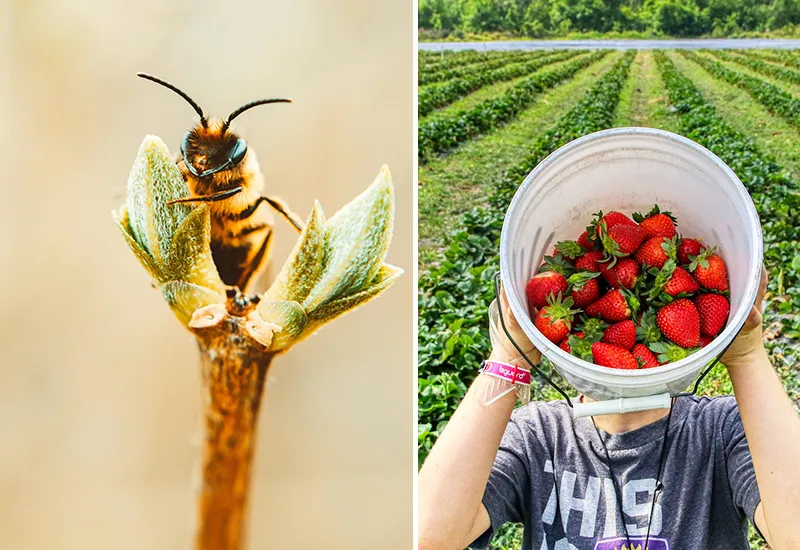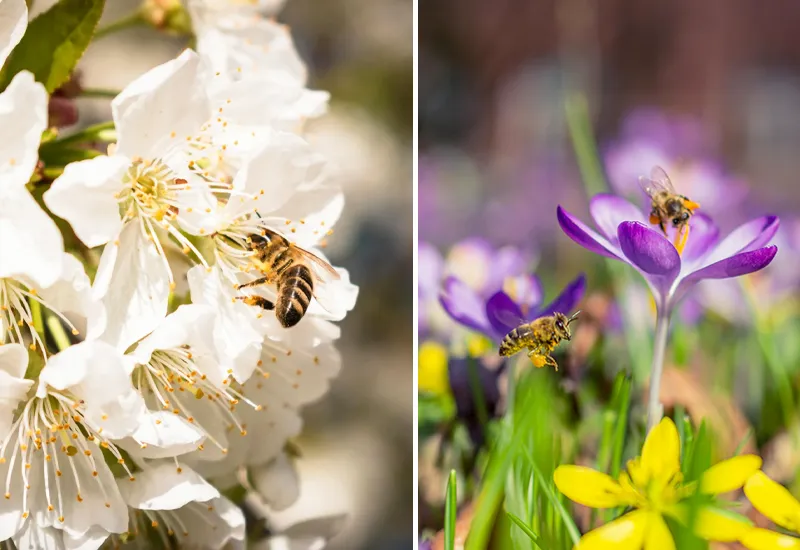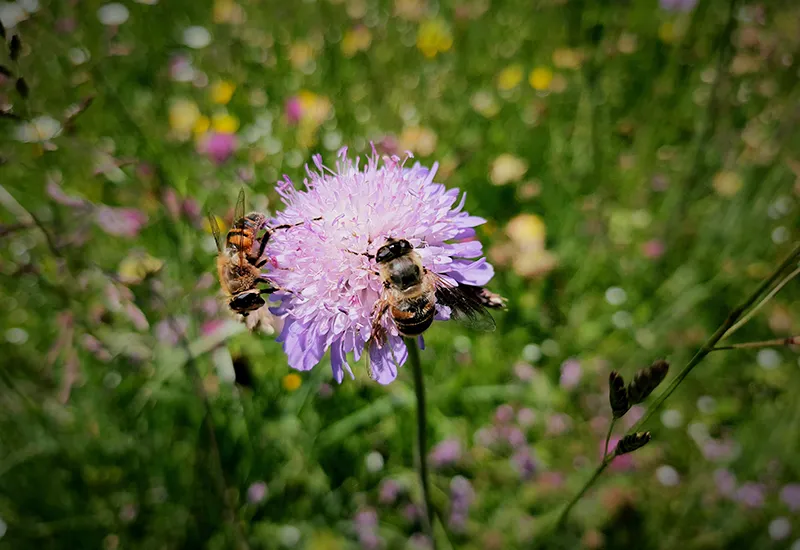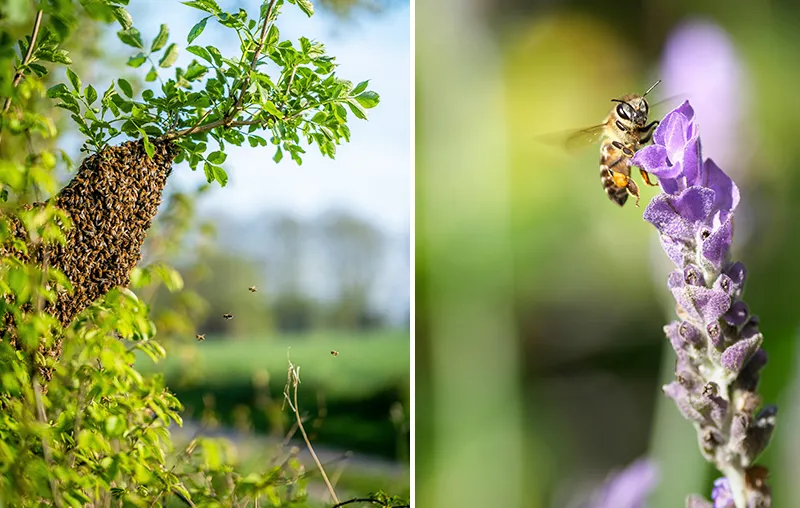Do you want to know why bees are so important and why we need to protect wild bees in particular? Then you've come to the right place! When we talk about bees, most of us probably think of the familiar honeybee. In contrast to the around 560 local wild bee species however, it is neither native nor endangered. It lives in the care of beekeepers, whose numbers are steadily increasing.
Wild bees, on the other hand, are not "looked after", play an irreplaceable role in our world - and are under threat. We must therefore protect them. Not least because their decline ultimately seals our own fate.
In this article, I would therefore like to delve into the world of wild bees with you and introduce you to the key reasons for protecting them. Finally, I'll also show you what you can do in your everyday life and, above all, how to protect them as much as possible. bee friendly garden you can do for the intelligent insects. Let's go!
10 reasons: Why do we need to protect wild bees?

We have no time to lose! Consider and use the following reasons for the protection of wild bees simply as additional motivation to promote their existence in your garden. And feel free to share your knowledge with the people around you, who should know why bees are so important.
1. wild bees are pollinators of our plants
According to BUND In Europe, around 150 different crop plants and around 80 percent of all wild plants are dependent on pollination by insects. Without the help of honey bees and especially wild bees, many plants cannot reproduce - nor can they flower or bear fruit.
With the help of pollination by wild bees, the Fruit set - compared to pollination by honey bees - even more so as a rule.1
Tomato and red clover for example, are only pollinated by certain bumblebees and other wild bee species. These plants are therefore dependent on the work of wild bees.
Tip: How the Plant pollination I explain how it works in principle in the linked blog article. So if you're interested in the topic, take a look there too!
2. bee mortality threatens our food security
The fewer bees there are, the less food there is are available to us. Strawberries, blueberries, raspberries, cucumbers, avocados, pumpkins, eggplants, nuts, soy (as it is animal feed and also meat products), margarine, rapeseed and sunflower oil - these and many other foods are largely dependent on the pollination services of bees.
Without the work of the bees, both the diversity of our food, as well as the harvest yields, will collapse massively. An absolute threat to the food supply and a pretty good reason to do more for the conservation of wild bees.
3. wild bees are threatened with extinction
We should protect wild bees simply because Around half of them are already on the Red List of Threatened Species stands.2 Some species of wild bee have already become extinct - and some, such as the early siskin bee, have already disappeared in several federal states.
The decline in wild bee populations is a serious warning signal and a good reason to become active yourself and stand up for these important insects.
Good to know: The number of honeybee colonies, which are also pollinators, is also declining. There are now 750,000 bee colonies - in the 1990s there were still around one million.3
4 Only we humans can save the wild bees
The Pesticide use in industrial agriculture, Monocultureshabitat loss due to Surface sealing, Parasites and viruses, air pollution and climate change - The decline of wild bees has many causes! Also the Beekeeping accelerates it, as honey bees compete for food with their mostly solitary, wild relatives and displace them.
Hand on heart: So we humans are to blame for bee mortality. And that is why only we can protect and save the wild bees - it is our responsibility.
5. we have the necessary knowledge

So we humans know why wild bees are endangered. But we also know exactly why, how we protect and promote them in practice can.
Unlike honey bees, for example, they are not organized in large colonies, but are rather solitary bees with their own offspring and their own nest. They also do not produce honey. They therefore have a completely different way of life - and accordingly have Completely different needs plants, materials and structures.
Here are a few examples of the individual requirements of certain wild bee species:
- Plant specialization: The buttercup scissor bee (Chelostoma florisomne) flies to the buttercup, the common hole bee (Heriades truncorum) to the meadow yarrow and the celandine mason bee (Osmia brevicornis) to the celandine.
- Material requirements: The willow sand bee (Andrena vaga) builds its ground nests mainly in flat and rather unvegetated sandy areas.
- Structural needs: The horned mason bee (Osmia cornuta) creates its brood cells mainly in crevices in rocks or walls, in dead wood passages or in hollow plant stems.
What I'm trying to say is, that we already know everything we need to know about wild beesto be able to protect them in a targeted manner. And that gives us another good reason to do so.
6 Without wild bees, other animals also lose their habitat
Wild bees are a crucial part of the food chain and of great importance to the Biodiversity on our earth. With their pollination service They ensure the survival of countless wild plants and animalsthat are dependent on these plants. Many native bird species in particular, whose diet consists mainly of plant seeds and berries, would suffer as a result.
Either way, the disappearance of the bees would ultimately be a Unstoppable chain reaction that threaten entire ecosystems.
7. wild bees are fascinating animals
Bees are extremely intelligent creatures with amazing behaviors - From nest building to communication.
Of course, I don't just mean the usual honey bee queen and her colony. Wild bees are also fascinating. They can, for example nest in the earth, perform dances or Perceiving UV rays. And the rose leaf cutter bee can even Wallpaper!
Protecting wild bees and making your own garden bee-friendly therefore also means, continue to learn from wild bees - and thereby automatically our Strengthening closeness to nature.
8. the economic output of wild bees is gigantic
Bees pollinate around 71 out of 100 crops, which cover 90 percent of the world's food requirements. Their pollination service therefore also has a high economic value, which is based on around 500 billion euros per year is appreciated.4
Among other things, bees support agriculture, horticulture and also secures jobs and local economies. Even those who find insects such as bees a nuisance in everyday life should be able to motivate themselves to protect bees, at least for economic reasons.
Tip: The species extinction is progressing and bees are by no means the only endangered species. Everything you need to know about them and what exactly you can do for biodiversityI will explain in the linked blog posts.
9. medicine is also dependent on the wild bee
Studies provethat honey from bees also has medicinal value. That is why it is also Important for numerous medicines and cosmetic productswhich can only be produced thanks to pollination by wild bees. Protecting bees can therefore also be important for human health.
10. the work of wild bees cannot be replaced
Neither the honey bee, nor modern technology, nor human manual laborcan artificially and adequately replace the work of the wild bee.
Some plants, such as tomatoes, can only be pollinated by wild bees (e.g. bumblebees), as the pollen in elongated anthers stored. They also work much more efficiently than honey bees - and are crucial for the protection of ecosystems and our environment in general.
Although there are Meanwhile robot beesbut experts are very skeptical about their help in the extensive pollination of plants. And the Hand pollination, as practiced in China is already taking place due to the dramatic retreat of wild bees, is not a long-term alternative. Even if we had no desire to protect bees, we would have no other choicethan protect the wild bees.
5 tips: What can everyone do in the garden to protect bees?

Finally, I would now like to give you a few valuable Tips and measures that you can use to help the wild bees in general and also to protect the Stop insect mortality can:
- Provide bee-friendly, native plants in your garden (e.g. rowan, hawthorn, sloe, raspberry, wine rose, mountain aster and meadow knapweed)
- Set to natural pest control (instead of pesticides and insecticides)
- Just let the lawn (with dandelions & co) grow (Keyword: Mowing-free May)
- Offer nesting aids for wild bees (e.g. Sandariumdeadwood, interlocking tiles with holes)
- Provide food all year round (e.g. thyme in summer and golden aster in fall)
Tip: For example, I have written a detailed article about Insect-friendly trees compiled. Be sure to check it out if you want to help the wild bees and other insects in your garden.
Why protect bees? Because we have no choice!
You now know Many good reasons to actively support wild bees - and there is certainly more! The promotion of the Environmental awareness and the Environmental Education in our society, for example.
Oh yes, and of course that we have no time left! Because if the small, hard-working pollinators no longer exist, it will also mean our own demise.
"If the bee disappeared off the surface of the globe, then man would have only four years of life left. No more bees, no more pollination, no more plants, no more animals, no more man."
Albert Einstein (more under Species protection quotes)
Motivated enough? Then start now, your Making your garden more bee-friendly and share your knowledge about the (threat to) wild bees with other people.
I hope this article has helped you! Do you have any questions, suggestions or other advantages of bee protection? Then, as always, feel free to write me a comment.
Stay bee-friendly,

PS: As Vegan I don't eat honeyas honey production is also a type of Factory farming for human purposes. If you want to find out more, click through to the linked articles on the blog next!
- NABU (Naturschutzbund Deutschland) e. V.: Rich harvest thanks to wild bee pollination, available at https://www.nabu.de/tiere-und-pflanzen/insekten-und-spinnen/hautfluegler/bienen/15573.html. [13.05.2024]. ↩︎
- Bund für Umwelt und Naturschutz Deutschland e.V. (BUND): Wild bees are exposed to many threats - and depend on protection, available at https://www.bund.net/themen/tiere-pflanzen/wildbienen/bedrohung-schutz. [13.05.2024]. ↩︎
- Federal Environment Agency: Bees - Indispensable for nature and production, available at https://www.umweltbundesamt.de/sites/default/files/medien/1/dokumente/bmelv_bienen.pdf. [13.05.2024]. ↩︎
- Statista GmbH: Wirtschaftsmacht Biene (as at: 15.05.2018), available athttps://de.statista.com/infografik/13843/wirtschaftsmacht-bienen. [13.05.2024]. ↩︎








